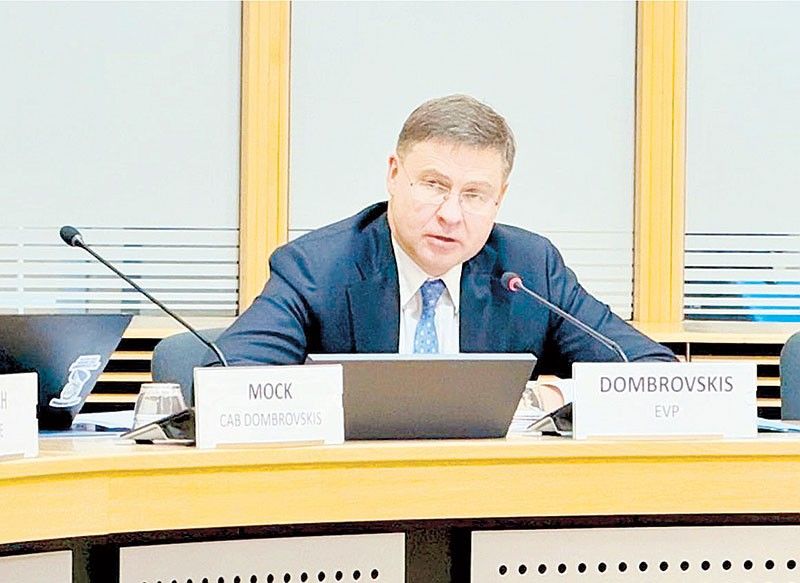Sustainability takes center stage in new trade era

MANILA, Philippines — How can moving boxes back and forth, between countries and across oceans and mountains, help protect the environment and fight climate change?
The European Union believes that indeed, trade can address the growing problem of climate change and other challenges in this era of multiple crises.
Thus, in today’s world, globalization is taking a new shape and direction and the EU is leading the change.
In a meeting in Brussels with journalists from third countries last March, a top EU official discussed the EU’s new “open, sustainable and assertive trade policy directions” which aim to address, among others, economic recovery post COVID-19, climate change and environmental degradation and growing international tensions.
Societal transformation
Essentially, the EU’s trade policy aims to “attain broader objectives such as the fight against climate change and the protection of the environment,” says Valdis Dombrovskis, executive vice president of the European Commission and EU trade commissioner.
“Finding the right balance between building a more sustainable future and transitioning to greener practices is a journey we’re all on together. It’s not just about meeting climate or sustainability goals; it’s about making sure our path to progress benefits us all,” he said.
Thus, he said, in order to meet common climate objectives, the EU is focused on “societal transformation” that will fundamentally impact all economic activities and require actions across policies, including trade policies.
Philippines-EU free trade agreement
What does this mean for the Philippines, which just last month announced the resumption of negotiations for a Free Trade Agreement (FTA) with the EU?
It would mean that whatever specific agreements the Philippines would enter into as part of the FTA, would be consistent with EU’s – and hopefully, the Philippines’ – climate change objectives.
The EU may, for instance, look into the sources of Philippine exports that would enter the European markets. Philippine food products for example, would have to be produced sustainably.
As Dombrovskis said, the new trade policy would create market access opportunities for “green goods and services.”
Moving forward, the Philippines would have to keep this in mind in the production of the goods and services it is targeting to bring to the European market.
“In the EU, for instance, we believe that trade can and should be a driver for accelerating a fair transition to a low-carbon and climate resilient economy,” Dombrovskis said.
Trade and sustainable development
On bilateral trade, he said, the EU has carefully adjusted its approach to FTAs to ensure they increasingly facilitate the green transition.
“All modern EU trade agreements contain rules on trade and sustainable development, having so-called TSD Chapters,” he said.
Aside from prioritizing the liberalization of green goods and services, trade agreement would promote sustainable public procurement. More importantly, trade agreements would remove barriers to trade and investment in renewable energy.
“In this context, trade and sustainable development committees, in the context of our trade agreements, are important platforms for these engagements,” he said.
The European green deal
Domestically, the EU has a target to be “climate neutral by 2050 and has an “ambitious goal to achieve 55 percent reduction of greenhouse gas emissions by 2030.”
“It is clear that the introduction of these measures will impact how we produce, consume, invest and also on our relationship with our international partners,” Dombrovskis said.
In all, the EU is pushing for a trade policy that is “open, sustainable and assertive.”
The openness agenda very broadly reflects the EU’s fundamental belief that addressing today’s challenges requires more – rather than less – global cooperation while the assertiveness agenda focuses on fighting “unfair practices” and the use of autonomous tools to act in situations where others are not playing by the rules.
It remains to be seen how the EU’s new trade policy would affect the Philippines especially in light of the FTA.
Cause-oriented groups are wary although business and export groups are excited.
Trade Justice Pilipinas said that “aside from very broad and sweeping statements about potential benefits from such a deal, however, very little has been disclosed about what the deal is about and whether or not it would be in the best interest of the Philippines to conclude this agreement.”
The public, it said, deserves transparency from the Philippine government about this deal that is again being negotiated on its behalf.
Filipinos can only hope that the much-touted FTA would indeed translate to better working conditions in the Philippines and help create a climate-resilient economy.
- Latest
- Trending



























